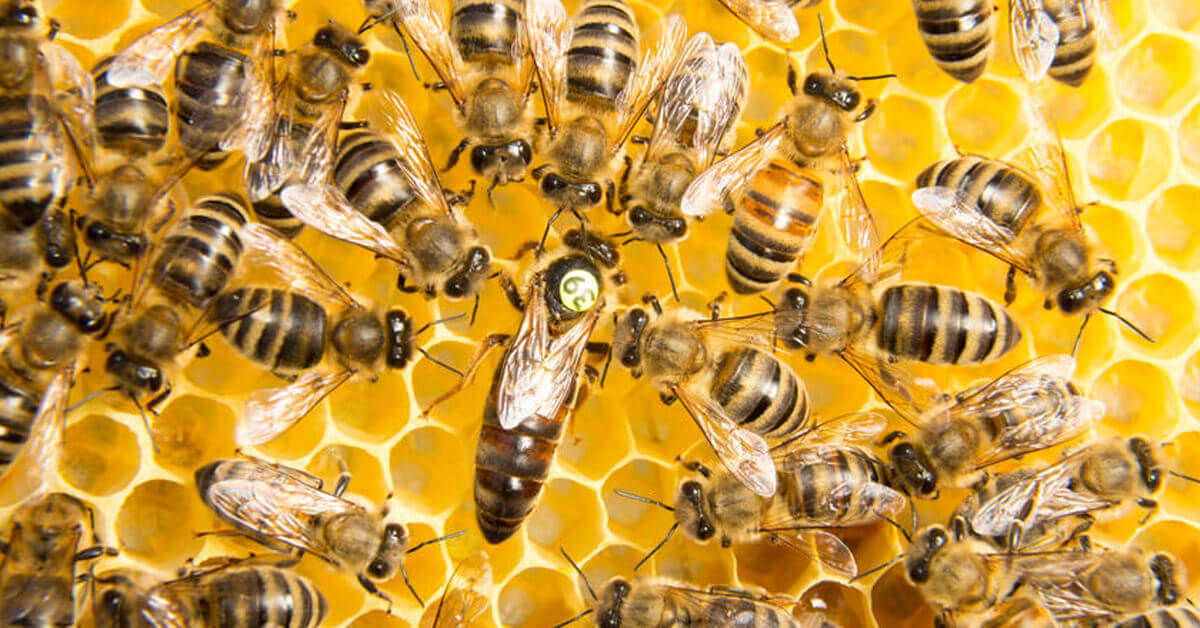
With so much conflicting dietary advice these days, you may become disheartened. You might wonder if your diet makes any real difference. Is there really a diet for dental health? Can your diet improve your oral health?
The answer is yes, because we’re starting to understand how nutrition affects our bodies and our genes.
How Nutrition Shapes Genes
Throughout history, many leaders have inherited their role. This inheritance has given them (and their families) the good life. But things are different in the animal kingdom.
Take bees, for example. The queen honeybee is fed, washed and escorted wherever she goes. But she didn’t win the genetic lottery. Her loyal worker bees are her siblings. They’re much smaller, live for a fraction of the time and can’t reproduce. Yet they share exactly the same DNA.
How can genetically identical siblings turn out so differently? The answer lies in how they’re fed. Nutrition shapes their genes.
Food fit for a queen
Until the third day, all bee larvae are fed royal jelly from nurse bees. Then, the majority are switched to a feed of pollen and nectar.
However, for reasons unknown, a few lucky larvae continue to receive royal jelly. Prolonged exposure to royal jelly sets off hormones that trigger the development of their reproductive system. These select larvae grow into the much larger queen bees.
This process doesn’t alter the DNA itself. Queen bee DNA remains identical to worker bee DNA. Instead, it acts via ‘tagging’ or methylation of the DNA helix. Methylation is the addition of small carbon groups to outside of the molecule (an ‘epigenetic’ change).
How diet changes your genes
The classical understanding of genetics is that our DNA is set in stone from birth. We now know that’s too simplistic. Just like honeybees, humans have tagging mechanisms. These allow our genes to communicate with our environment, including our food.
This means there really is a diet for healthy teeth. Food matters to our oral health and general health, too.
Breastmilk: A message for our genes
Our nutritional messaging system is far more complex than that of honeybees. Various bioactive components, such as polyunsaturated fatty acids, ‘tag’ DNA. This may assist in switching on complex gene expression linked to crucial early development.
We receive dietary messages through breast milk an possibly through every meal in our lives. Currently, it’s recommended that mothers breastfeed for 6 months. We know that during this time, breast milk changes its composition. These changes don’t involve nutritional basics such as fat, protein and carbohydrates. Instead, they affect more complex, bioactive components (e.g. bacterial populations and immunological cells). This is far beyond the common nutritional knowledge behind our dietary guidelines.
Via breastmilk, we receive an epigenetic dietary messages from our mother. This seems to influence life-long health. Research has linked this to better brain and immune development. Beyond childhood, benefits include a lowered risk of communicable and non-communicable diseases like obesity.
Food for thought
Our eating habits won’t give us the life of a queen bee. However, our genes interact with food in ways we’re just starting to understand. Every meal represents a discussion with your genes.
For example, we know that what we eat has a profound effect on our teeth and oral health. Yet few of us are following a diet for healthy teeth. Our modern diet is the cause of much of our tooth decay, gum disease and crooked teeth. It lacks the essential fat-soluble vitamins and raw foods that strengthen our jaw muscles and teeth.
Our new understanding of epigenetics shows our body is designed to adapt to environmental signals. Hence, every bite counts. Your diet does influence your oral health. You literally are what you eat.
Now we want to hear from you. Please leave your questions in the comments below.
For more information on Dr. Lin’s clinical protocol that highlights the steps parents can take to prevent dental problems in their children: Click here.
Want to know more? Dr Steven Lin’s book, The Dental Diet, is available to order today. An exploration of ancestral medicine, the human microbiome and epigenetics it’s a complete guide to the mouth-body connection. Take the journey and the 40-day delicious food program for life-changing oral and whole health.
Click below to order your copy now:
US AMAZON
US Barnes & Noble
UK AMAZON
Australia BOOKTOPIA
Canada INDIGO








2 Responses
Great information! I know of an AMA Category 1 CME/CEU Course, Nutritional Supplementation: Theory or Therapy, that will be offered Sept 8 – 10th in McLean, VA. There will be 3 session on Nutrigenomics. Health professionals, across the spectrum, are implementing Gene SNP DNA Analysis in their practices and, I believe, some will be there to share their experiences with this ground breaking technology. If you would like more information, please let me know.
Best,
Cindy
Thanks for the information Cindy